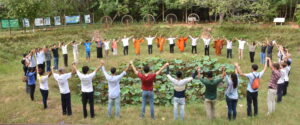As previously announced here, in the context of the collaboration between the IIRF and the School of International Relations of the Latin American University of Science and Technology (ULACIT) of Costa Rica, students of the course “International Political Economy” developed an analysis of the relationship between religious freedom and development. This is the second post published as the students’ contribution to the IIRF.
Authors:
- Katherine Hernández
- Mónica Naranjo
- Natalie Hernández
Religious Freedom and Development is a broad topic and in this specific paper, we will touch on several important points. For example, religious freedom and economic development, also, religious freedom and political systems, how they are related, and how we as citizens can better understand the relations between religious and political systems, and the importance of religious freedom and society.
Religious Freedom and Economic Development
One of the main impacts of freedom of religion on economic development is the role it plays in foreign investment. Although this has been a little-explored sector, when analyzing the factors and business context that allow states to attract foreign investment, it is possible to find a link between these two areas.
On the one hand, we can highlight that religion plays an important role in people’s daily lives, how they relate to each other, how they organize, and how they govern, and this impacts how a country’s context is shaped. In fact, though target companies are under great scrutiny as far as profitability, growth, and potential are concerned, national factors such as country risk, political stability, and population and gross national product (GNP) growth can be deciding factors for investing companies. A lack of freedom of belief in a country can result in tensions and hostilities and thus affect the environment for investment and economic growth.

This last statement was confirmed by Klocek and Bledsoe (2022), when they explained that religious restrictions and hostilities—and associated conflicts—can contribute to conditions that undercut domestic and foreign investment, thereby curtailing economic growth. For example, Dolansky and Alon exposed Japan’s case where 54% of Japanese practice both Buddhism and/or Shintoism, and they can peacefully exist together which is an example of religious tolerance in Japan. This is the reason why Japanese avoid investing in certain countries that practice a particular religion. Lack of religious freedom can cause tensions and hostilities between minority religious groups resulting in uncertainty that generates risks for the performance and profits of multinational companies and can result in the retreat of the corporation and affect the economic growth of the country.
From an International Political Economy (IPE) perspective, this type of scenario can cause challenges regarding resource allocation. In fact, Klocek and Bledsoe affirm that these conditions include deterring investment in the civilian economy, disruption of critical sectors of the economy (including basic supplies, equipment, and access to jobs), and limitations on diversity in the marketplace. Consequently, if there is a lack of freedom of religion, states can choose to invest resources in a certain aspect that may disadvantage a specific minoritarian religious group, or those who profess religion in general, which could cause conflicts to freedom of belief ongoing and still damage the state’s economy in terms of foreign investment.
However, it is worth highlighting that from IPE, any choice made in favor of one use or group, will imply giving up another use or group. But, according to Oatley decisions about resource allocation have welfare consequences – that is, they determine the level of societal well-being. Therefore, in order to avoid negative welfare consequences at the time of deciding how to allocate resources it is important to first take decisions based on what will bring greatest benefits, and second to have a context without hostilities due to limitations on beliefs.
Freedom of Religion and Social Development
Religious freedom is the deep-rooted right of individuals to choose, express, and practice their religious beliefs without the fear of persecution or coercion. It is a fundamental human right protected by international laws (Universal Declaration of Human Rights), and it’s also recognized by various institutions worldwide. (First Amendment). This is the pillar of an equitable society and plays an important role in shaping the future of development in society, fostering economic growth, political stability, and overall sustainable development.
The Religious Freedom and Economic Growth research paper shows that when a society provides freedom of religion, it leads to economic growth. When individuals are free to pursue their religious beliefs, they feel empowered to participate in entrepreneurial behaviors, contribute to innovation, and therefore drive economic growth. These religious communities usually establish institutions that provide healthcare, education, and social services, which alleviates the burden governments have in bettering social well-being. Religious freedom also feeds a climate of tolerance, and respect, that attracts professionals, and this inflow of human capital stimulates economic activity.
This practice also works as a unifying force, which fosters social union within diverse societies. As individuals are free to practice their beliefs, they experience a sense of belonging, identity, and community. As mentioned earlier, regarding promoting respect and tolerance. Religious communities play a key role in addressing social problems, such as poverty; and it’s also a center for social interaction, and for individuals to build relationships.

It also contributes to political stability, as it promotes peaceful conflict resolutions and civic engagement. Individuals are free to express their religious beliefs without the fear of being repressed, which makes them less likely to resort to violence for conflict resolution. Lastly, religious freedoms also play a crucial role in achieving sustainable development by providing responsible resource management, and environmental consciousness. Many religious traditions highlight humans’ interconnectedness with the environment, which leads to a sense of responsibility toward these matters.
This aspect of religious freedom, i.e. the impact it has on society, makes it clear that religious freedom is the pillar of societal development as it promotes social union, economic growth, and is the basis for political stability. It also contributes to sustainable development and prosperity. It’s critical to work towards a future in which religious freedom is an established practice in all societies and political environments, as it leads to societal stability and enrichment.
Religious Freedom and the Political System
The political system and religious freedom are connected in many ways and have influenced each other. These connections can be modified according to a specific country. Many debates or discussions regarding freedom of religion have an impact and focus on most of them in traditional religious communities in a country.
According to research, certain restrictions imposed by the government such as favoritism of religious groups, general laws, and policies restrict religious freedom and result in harassment of religious groups by governments and limit religious activities.
We can say there exists a link between restrictions on each religion and different kinds of governments. For example, in China, Myanmar, and Russia; those governments are classified as authoritarian because of the very high government restrictions. In the same way, one key point to consider is authoritarianism, in an authoritarian political system the government can limit religious freedom as a restriction of expression, and religious worship.

Moreover, our understanding of democracy is that everyone has a voice and a vote. Democracy protects the freedom and the rights of the citizens, including religious freedom, but some investigations said that democracy does not guarantee religious freedom because when problems occur the minority and the majority groups have to debate the limits of religious freedom.
One of the most important key points is Human Rights. The Universal Declaration of Human Rights, article 18, mentions the importance of religious freedom as a fundamental right, “Everyone has the right to freedom of thought, conscience, and religion; this right includes freedom to change his religion or belief, and freedom, either alone or in community with others and in public or private, to manifest his religion or belief in teaching, practice, worship, and observance.” (Universal Declaration of Human Rights).
When analyzing the interrelation between different aspects of life, the state and religious freedom it becomes obvious that religious freedom is not only an individual part of each person’s life, but also affects other aspects like development and economic growth. In addition, we can determine that other areas like the political system affect how free people are to express their beliefs. Therefore, freedom of religion is something that shouldn’t be studied isolated from other areas of life.
Throughout this paper we have understood that Religious Freedom is the pillar of development. Regarding the impact that it has on social development and its impact on economic growth, it is the basis of empowerment, social cohesion, and environmental care. Recognized as a fundamental human right, it has also been acknowledged for its role in advancing societal development.
With this type of analysis, it is possible to show that the absence of freedom of religion can cause hostilities and tensions between society and even states to emerge, discouraging foreign investment and economic growth. However, it is crucial to take into consideration that the consequences of religious repression have an impact not only on a national scale but on an international scale as well, since it influences the decisions of multinational corporations, which affects global economics.
Also, it is necessary to take into consideration that the different benefits of religious freedom are not restricted only to the social and economic sphere, since they are extended to environmental awareness, responsibility for resource distribution, and contribution to a harmonious global environment. Therefore, the search for a future where freedom of religion is protected and universally recognized becomes an important matter for human rights, stability, and prosperity.